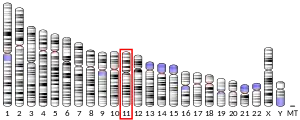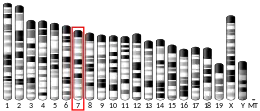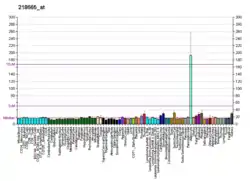Frizzled-4
Frizzled-4 (Fz-4) is a protein that in humans is encoded by the FZD4 gene.[5][6][7] Fz-4 has also been designated as CD344 (cluster of differentiation 344).
Function
This gene is a member of the frizzled gene family. Members of this family encode seven-transmembrane domain proteins that are receptors for the Wingless type MMTV integration site family of signaling proteins. Frizzled-4 is the only representative of frizzled family members that binds strongly an additional ligand Norrin that is functionally similar but structurally different from Wingless type proteins.[8] FZD4 signaling induced by Norrin regulates vascular development of vertebrate retina and controls important blood vessels in the ear. Most frizzled receptors are coupled to the beta-catenin canonical signaling pathway. This protein may play a role as a positive regulator of the Wingless type MMTV integration site signaling pathway. A transcript variant retaining intronic sequence and encoding a shorter isoform has been described, however, its expression is not supported by other experimental evidence.[7]
See also
References
- GRCh38: Ensembl release 89: ENSG00000174804 - Ensembl, May 2017
- GRCm38: Ensembl release 89: ENSMUSG00000049791 - Ensembl, May 2017
- "Human PubMed Reference:". National Center for Biotechnology Information, U.S. National Library of Medicine.
- "Mouse PubMed Reference:". National Center for Biotechnology Information, U.S. National Library of Medicine.
- Kirikoshi H, Sagara N, Koike J, Tanaka K, Sekihara H, Hirai M, Katoh M (Nov 1999). "Molecular cloning and characterization of human Frizzled-4 on chromosome 11q14-q21". Biochemical and Biophysical Research Communications. 264 (3): 955–61. doi:10.1006/bbrc.1999.1612. PMID 10544037.
- Toomes C, Bottomley HM, Jackson RM, Towns KV, Scott S, Mackey DA, Craig JE, Jiang L, Yang Z, Trembath R, Woodruff G, Gregory-Evans CY, Gregory-Evans K, Parker MJ, Black GC, Downey LM, Zhang K, Inglehearn CF (Apr 2004). "Mutations in LRP5 or FZD4 underlie the common familial exudative vitreoretinopathy locus on chromosome 11q". American Journal of Human Genetics. 74 (4): 721–30. doi:10.1086/383202. PMC 1181948. PMID 15024691.
- "Entrez Gene: FZD4 frizzled homolog 4 (Drosophila)".
- Xu Q, Wang Y, Dabdoub A, Smallwood PM, Williams J, Woods C, Kelley MW, Jiang L, Tasman W, Zhang K, Nathans J (March 2004). "Vascular development in the retina and inner ear: control by Norrin and Frizzled-4, a high-affinity ligand-receptor pair". Cell. 116 (6): 883–895. doi:10.1016/S0092-8674(04)00216-8. PMID 15035989. S2CID 18687651.
Further reading
- Li Y, Fuhrmann C, Schwinger E, Gal A, Laqua H (Jun 1992). "The gene for autosomal dominant familial exudative vitreoretinopathy (Criswick-Schepens) on the long arm of chromosome 11". American Journal of Ophthalmology. 113 (6): 712–3. doi:10.1016/s0002-9394(14)74800-7. PMID 1598965.
- Tanaka S, Akiyoshi T, Mori M, Wands JR, Sugimachi K (Aug 1998). "A novel frizzled gene identified in human esophageal carcinoma mediates APC/beta-catenin signals". Proceedings of the National Academy of Sciences of the United States of America. 95 (17): 10164–9. Bibcode:1998PNAS...9510164T. doi:10.1073/pnas.95.17.10164. PMC 21479. PMID 9707618.
- Sagara N, Kirikoshi H, Terasaki H, Yasuhiko Y, Toda G, Shiokawa K, Katoh M (Apr 2001). "FZD4S, a splicing variant of frizzled-4, encodes a soluble-type positive regulator of the WNT signaling pathway". Biochemical and Biophysical Research Communications. 282 (3): 750–6. doi:10.1006/bbrc.2001.4634. PMID 11401527.
- Takeda S, Kadowaki S, Haga T, Takaesu H, Mitaku S (Jun 2002). "Identification of G protein-coupled receptor genes from the human genome sequence". FEBS Letters. 520 (1–3): 97–101. doi:10.1016/S0014-5793(02)02775-8. PMID 12044878. S2CID 7116392.
- Hering H, Sheng M (Jun 2002). "Direct interaction of Frizzled-1, -2, -4, and -7 with PDZ domains of PSD-95". FEBS Letters. 521 (1–3): 185–9. doi:10.1016/S0014-5793(02)02831-4. PMID 12067714. S2CID 39243103.
- Robitaille J, MacDonald ML, Kaykas A, Sheldahl LC, Zeisler J, Dubé MP, Zhang LH, Singaraja RR, Guernsey DL, Zheng B, Siebert LF, Hoskin-Mott A, Trese MT, Pimstone SN, Shastry BS, Moon RT, Hayden MR, Goldberg YP, Samuels ME (Oct 2002). "Mutant frizzled-4 disrupts retinal angiogenesis in familial exudative vitreoretinopathy". Nature Genetics. 32 (2): 326–30. doi:10.1038/ng957. PMID 12172548. S2CID 21389657.
- Chen W, ten Berge D, Brown J, Ahn S, Hu LA, Miller WE, Caron MG, Barak LS, Nusse R, Lefkowitz RJ (Sep 2003). "Dishevelled 2 recruits beta-arrestin 2 to mediate Wnt5A-stimulated endocytosis of Frizzled 4". Science. 301 (5638): 1391–4. Bibcode:2003Sci...301.1391C. doi:10.1126/science.1082808. PMID 12958364. S2CID 34975427.
- Toomes C, Downey LM, Bottomley HM, Scott S, Woodruff G, Trembath RC, Inglehearn CF (Jan 2004). "Identification of a fourth locus (EVR4) for familial exudative vitreoretinopathy (FEVR)". Molecular Vision. 10: 37–42. PMID 14737064.
- Yao R, Natsume Y, Noda T (Aug 2004). "MAGI-3 is involved in the regulation of the JNK signaling pathway as a scaffold protein for frizzled and Ltap". Oncogene. 23 (36): 6023–30. doi:10.1038/sj.onc.1207817. PMID 15195140.
- Toomes C, Bottomley HM, Scott S, Mackey DA, Craig JE, Appukuttan B, Stout JT, Flaxel CJ, Zhang K, Black GC, Fryer A, Downey LM, Inglehearn CF (Jul 2004). "Spectrum and frequency of FZD4 mutations in familial exudative vitreoretinopathy". Investigative Ophthalmology & Visual Science. 45 (7): 2083–90. doi:10.1167/iovs.03-1044. PMID 15223780.
- Omoto S, Hayashi T, Kitahara K, Takeuchi T, Ueoka Y (Jun 2004). "Autosomal dominant familial exudative vitreoretinopathy in two Japanese families with FZD4 mutations (H69Y and C181R)". Ophthalmic Genetics. 25 (2): 81–90. doi:10.1080/13816810490514270. PMID 15370539. S2CID 32817238.
- Yoshida S, Arita R, Yoshida A, Tada H, Emori A, Noda Y, Nakao S, Fujisawa K, Ishibashi T (Oct 2004). "Novel mutation in FZD4 gene in a Japanese pedigree with familial exudative vitreoretinopathy". American Journal of Ophthalmology. 138 (4): 670–1. doi:10.1016/j.ajo.2004.05.001. PMID 15488808.
- Qin M, Hayashi H, Oshima K, Tahira T, Hayashi K, Kondo H (Aug 2005). "Complexity of the genotype-phenotype correlation in familial exudative vitreoretinopathy with mutations in the LRP5 and/or FZD4 genes". Human Mutation. 26 (2): 104–12. doi:10.1002/humu.20191. PMID 15981244. S2CID 20271372.
- Nallathambi J, Shukla D, Rajendran A, Namperumalsamy P, Muthulakshmi R, Sundaresan P (2006). "Identification of novel FZD4 mutations in Indian patients with familial exudative vitreoretinopathy". Molecular Vision. 12: 1086–92. PMID 17093393.
- Planutis K, Planutiene M, Moyer MP, Nguyen AV, Pérez CA, Holcombe RF (2007). "Regulation of norrin receptor frizzled-4 by Wnt2 in colon-derived cells". BMC Cell Biology. 8: 12. doi:10.1186/1471-2121-8-12. PMC 1847812. PMID 17386109.
External links
- "Frizzled Receptors: FZD4". IUPHAR Database of Receptors and Ion Channels. International Union of Basic and Clinical Pharmacology.]
- GeneReviews/NCBI/NIH/UW entry on Familial Exudative Vitreoretinopathy, Autosomal Dominant
This article incorporates text from the United States National Library of Medicine, which is in the public domain.




